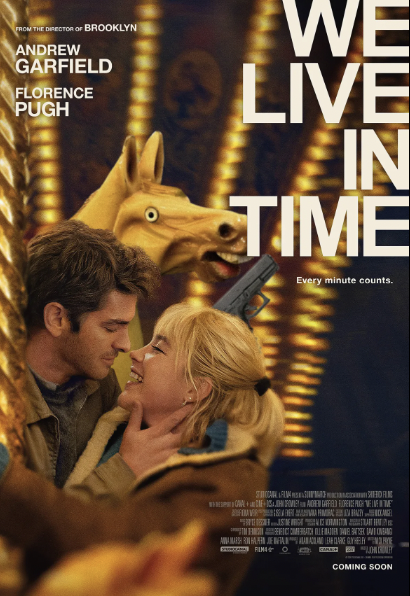If you’re looking for a movie with a tragic love story, that could actually happen in real life, “We Live in Time” is for you.
When I first went to the theater to see “We Live in Time,” I was walking in when a woman suddenly stopped me and said, “Wait, is this the one with Florence Pugh and Andrew Garfield?” Upon my agreement, she immediately continued her speed walk into the theater. With that being said, the casting choices were absolutely amazing and were probably the main reason that people watched the movie.
The plot follows three different timelines of stages in the main couple’s, Tobias (Garfield) and Almut’s (Pugh), relationship. The film opens with a severe cancer diagnosis for Almut, who speaks to Tobias about an impossible decision: six months of great life or a year of miserable chemo that might not work anyway. From then on it unfolds into different scenes following how the couple met, their struggle to have children and the tough decisions to follow after Almut’s cancer diagnosis.
Initially, the timeline switching can be a bit difficult to follow especially because the couple didn’t really seem to age over time. Personally, I didn’t find it too hard to follow because I had already watched the trailer and had an idea of what the plot was about. The other bigger hint was once Almut became pregnant the timeline switch to the middle of their relationship was obvious, it also became easier to tell when it was in the present when she shaved her head during chemotherapy.
However, for fans wanting a cute rom-com this movie is not for you. It’s characterized as a romantic drama, and touches on some serious themes such as making every day count and the modern-day struggle over the decision to have children. I liked Pugh’s character of the contemporary women, but I feel like it could have been done better. She originally was against the idea of having children early and was more of a causal relationship person. This caused her and Tobias to have their first fight, but then the plot immediately jumped to their reconciliation and her backpedaling and deciding to try for children— juxtaposing the slow-burn nature of their relationship.
Almut’s passion for cooking, though, added some depth to her character that Tobias sadly lacked. Tobias was the sweet supportive husband with some emotional trauma from his first marriage, but I’m afraid they made his character a little too vanilla. Some could misinterpret the open modernity of Pugh’s character and make her out to be the villain of the story; by not conforming to traditional expectations all the time, sometimes focusing on her passions rather than motherhood and quite literally hitting him with her car.
Overall, despite the sometimes bland script, Pugh and Garfield have great on-screen chemistry, and depending on your expectations this could be a heartbreaking movie, in a good way. If you focus on the larger more impactful themes, “We Live in Time” creates a great almost doomed romance that takes you on a journey about the joys and complexities of love and life.


